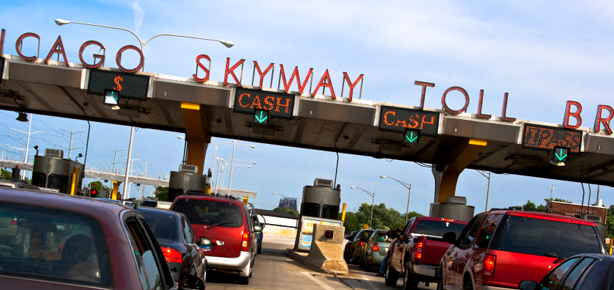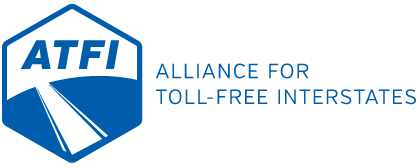TOLLS
In 1998, Congress established the Interstate System Reconstruction and Rehabilitation Pilot Program, which authorized three toll pilot projects, one in each of three states, to toll an interstate highway, bridge or tunnel. Due to significant public and political opposition, attempts at tolling under the program have been unsuccessful. These failed attempts have cost states and the federal government millions of taxpayer dollars.
Since its creation, the Federal Interstate System has been financed under the philosophy that roads should be funded primarily through fuel taxes, not tolls (with the exception of interstate segments that pre-date the establishment of the Interstate System in 1956).

Tolling existing interstate lanes has never been successful, and the evidence demonstrates the negative effect of tolling on public safety, congestion, the environment and the economy.
However, with Congress debating long-term funding for transportation and states looking for additional dollars, the tolling industry is pressuring lawmakers to open existing federal interstate capacity to new tolls.
INEFFICIENCY
Waste of Taxpayer Money
Decades of data shows that toll infrastructure is inherently inefficient and takes many years to generate any net income.
According to the Transportation Research Board of the National Academy of Sciences, the administrative, collection and enforcement costs of a typical toll facility are 33.5% of the revenue generated. Compare this to the Board’s finding that the administrative cost of the fuel tax is about 1% of revenue.
- In 2003, researchers in New Jersey calculated the annual cost of electronic toll collection on the Garden State Parkway to be $46.9 million—or about 92% of what it cost the federal government to collect federal gasoline taxes in all 50 states during that year.
- According to the North Texas Tollway Authority (NTTA), in 2012, over 7% of the total revenue generated by NTTA was never recovered due to evasion and other collection problems.
DIVERSION
Traffic Diversion
Electronic tolls can cause delays and make roadways less safe by disrupting traffic patterns around the toll facility.
Traffic diversion creates congestion on the local and secondary roads near toll facilities. This congestion delays response times for emergency personnel who rely on these secondary routes to quickly get to and from accidents and emergencies.
A recent study on the effects of tolls in North Carolina predicted that tolls would divert up to 36% of traffic to alternate routes, contributing to delays, traffic accidents, and wear and tear on smaller secondary roads that were not built to handle high traffic levels.
Local communities must deal with the consequences of traffic diversion created by tolls. Local roads deteriorate when they must accommodate traffic volumes that they were not built to handle. When these roads need to be fixed, it is the local communities and states that must pay. This diversion also hurts local businesses that depend on interstate drivers for their customers.
- A 2013 Economic Assessment of I-95 in North Carolina estimated that between 2014 and 2050 diversion from tolls on I-95 would cost approximately $1.1 billion dollars in revenue to businesses within a mile of the I-95 corridor in North Carolina.
TOLLS ARE TAXES
Double Taxation
Taxes paid to build interstates and fuel taxes continue to pay to maintain them. New tolls would tax users twice.
Since the inception of the Federal Interstate Highway System, the federal gas tax has always been the primary source of revenue for the construction and maintenance of federal interstate lanes. Every time a motorist puts gas in his vehicle, he is paying his share for interstate maintenance.
A new toll on an existing interstate forces a motorist to pay two taxes for that same road: a gas tax and a toll tax.
Tolls on existing interstates are particularly unfair due to their disproportionate effect on low-income Americans and the elderly living on fixed incomes, who must pay a higher percentage of their income to be able to access the interstate. Within a city or a town there may be a number of alternate route choices, but there is no economically viable substitute for the Interstate Highway System in terms of connecting people and goods over long distances.
BAD FOR BUSINESS
Economic Impacts
Tolls increase the cost of delivering goods and services, putting local businesses at a competitive disadvantage and increasing the cost of living for residents.
- A 2009 study on the impact of potential tolls on I-80 in Pennsylvania estimated that shippers, truckers, and consumers would suffer a combined annual deadweight loss of between $8 and $15 million dollars per year.
- In Mercer Island, Washington, where officials are considering adding tolls to I-90, it is estimated that workers commuting to the island will pay an extra $1,300 each year just to get to and from work.
Beyond the direct effects of paying the toll, local communities must deal with the consequences of traffic diversion created by tolls. Local roads deteriorate when they must accommodate traffic volumes that they were not built to handle. When these roads need to be fixed, it is the local communities and states that must pay. This diversion also hurts local businesses that depend on interstate drivers for their customers.
A 2013 Economic Assessment of I-95 in North Carolina estimated that between 2014 and 2050 diversion from tolls on I-95 would cost approximately $1.1 billion dollars in revenue to businesses within a mile of the I-95 corridor in North Carolina.
PUBLIC OPINION
Americans Hate Tolls
Poll after poll has clearly demonstrated that the public is strongly against the idea of tolling America’s Interstate system.
- 76% of participants opposed tolling roads in Virginia as a way to pay for regional transportation improvements.
- 63% of North Carolina residents opposed making some highways toll roads.
- In California, 60% of residents were opposed to a toll of $5 or more, even for a travel time savings of up to 40 minutes.
Clearly, the public wants alternatives to tolling.



